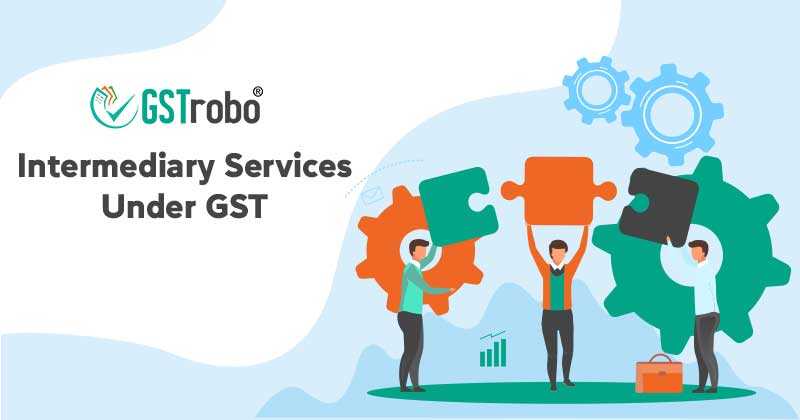Intermediary Services under GST
In basic words, an intermediary is someone who helps individuals to reach an agreement, who are reluctant or unable to communicate directly. To put it another way, an intermediary is a company or somebody (such as a broker or a consultant) who works as a moderator or a connection between the parties to a commercial agreement, investment decision, or other transaction.
A bank is a clear example of an intermediary service that works as an intermediary between depositors wanting interest income and borrowers seeking loan capital. Intermediaries are experts in a certain field who act as a conduit for a specific market.

The implementation of the Goods and Service Tax (GST) has a significant influence on the taxability of ‘intermediary services.’ And in this blog, we will discuss the application and taxation of intermediary services under GST.
- Definition of Intermediary Services under GST
- Example of Intermediary Services under GST
- Determining the Place of Supply for Intermediary Services
- Exports of Service Via Intermediary to The Recipients Outside India
- GST Applicability on Intermediary Income
- Intermediary Services under GST – Latest Updates
Definition of Intermediary Services under GST
The following definition of intermediary is taken from section 2 (13) of the IGST Act, 2017, and is reproduced here for your convenience: “intermediary means a broker, an agent, or any other person, by whatever name called, who arranges or facilitates the supply of goods or services, or both, or securities, between two or more persons, but does not include a person who supplies goods or/and services or securities on his own account.”
The following are some of the key characteristics that can be deduced from the preceding definition of “intermediary”:
- A broker, an agent, or any other person can act as an intermediary.
- An intermediary is a person who organizes or facilitates the provision of goods or services, or both, between two or more people but not from his own account.
- The kind of supply given by his principal cannot be changed by an intermediary.
Example of Intermediary Services under GST
Let’s have a look at a basic example to see what we’re talking about.
A wholesaler purchases products from manufacturers and resells them. Because the wholesaler owns the products he sells, the provision of this service is not an intermediate service. It is not essential for him to possess all of the items maintained in the wholesaler’s location. It is sufficient if the producer transfers the products to the wholesaler shortly before the sale and the wholesaler sells the goods to his buyer on his own account. This individual is not acting as a middleman. The commissions’ agent sells the same goods, but the transaction is taking place between the manufacturer and the customer; the commission agent is not the owner of the goods at the time of the sale. So, in this case, the commission agent serves as an intermediary.
Determining the Place of Supply for Intermediary Services
It is critical to know the place of supply of goods or services to accurately determine the tax applicability of GST, i.e., whether CGST, SGST, or IGST is due on any transaction. The taxable status of goods or services would be determined by the place of supply of those goods or services.
According to Section 13 (8) of the IGST Act,
The pace of supply of the following shall be the location of the supplier of services, namely:
(a) Services provided to account holders by a banking company, a financial institution, or a non-banking financial firm;
(b) Services provided by intermediaries;
(c) Services consisting of the hiring of a mode of transportation including yachts but excluding aircraft and vessels for a duration of up to 1 month.
As a result of the aforementioned requirements of section 13 (8)(b), it is obvious that the place of supply of the intermediate service would be the location of the service provider.
Exports of Service Via Intermediary to The Recipients Outside India
One of the key conditions under sub-clause (iii) of section 2(6) of the Integrated Goods and Service Tax Act, 2017 for a service to be classified as an ‘export of service’ is that the place of supply of service should be outside India.
In the case of specific provisions of the ‘place of supply’ affecting ‘intermediary services,’ as narrated herein, the place of supply shall be the location of the supplier of services, resulting in ‘intermediary services’ being unable to be classified as ‘export of services.’ Thus, the benefits available under ‘export of services’ are unavailable to them.
GST Applicability on Intermediary Income
GST Applicability on Intermediary Income. The earnings via commission are subject to GST, and all the requirements of the GST law apply in this case.
Intermediary Services under GST – Latest Updates
The finance minister in 45th GST Council Meeting stated that services outsourced to India and those provided locally for foreign businesses would not be considered intermediary services, allowing them not to pay the 18% GST.
